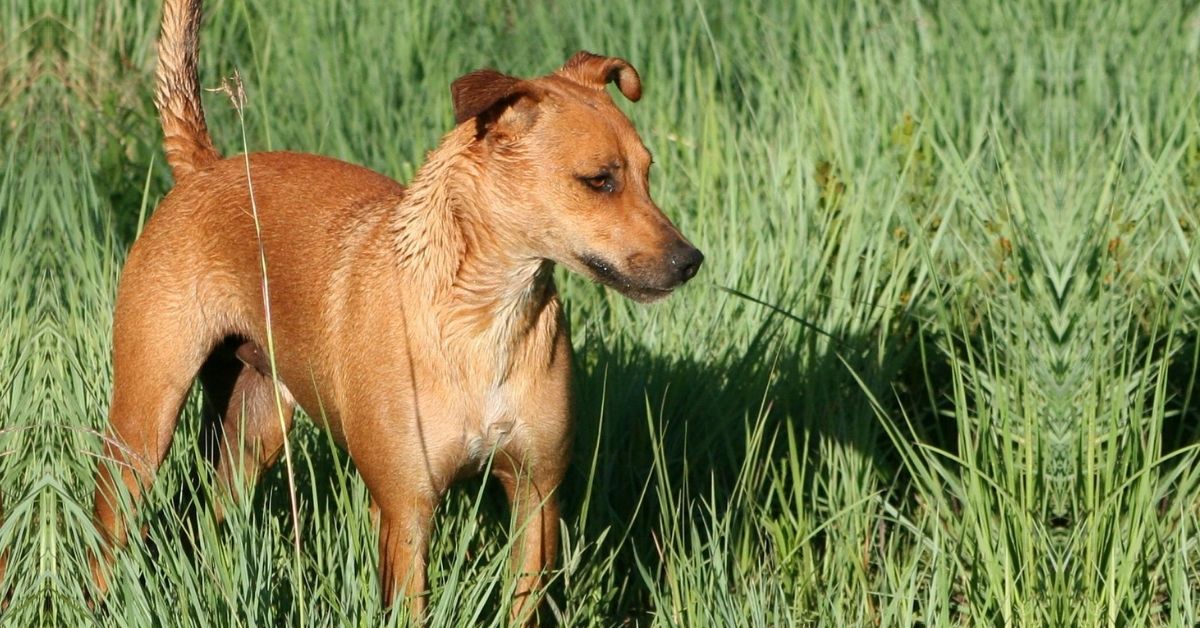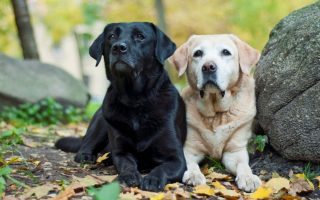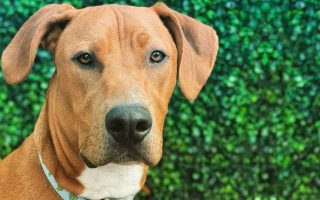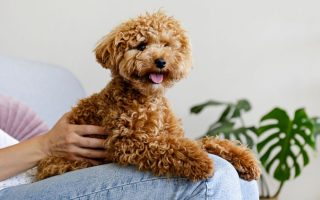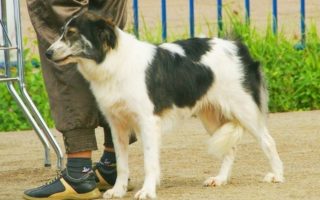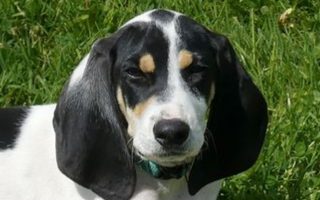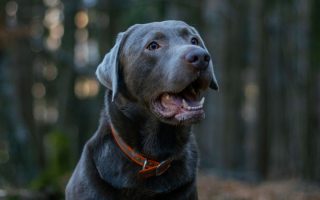The Zulu dog, which emerged from the southern part of Africa, is considered the national dog of Africa and was fashioned through the selective breeding of Mother Nature herself.
Making a decision to own a pet is a big one as there are many factors to consider.
You need a dog that can fit into your living environment, family, lifestyle, and level of activity. It can get daunting, but information makes the process easier.
This article presents everything you need to know about Africanis dog breed information and facts and answers the question on every pet parent’s mind.
Is Africanis dog breed right for me, or should I look somewhere else? Read on.
Key Africanis Dog Breed Information & Facts
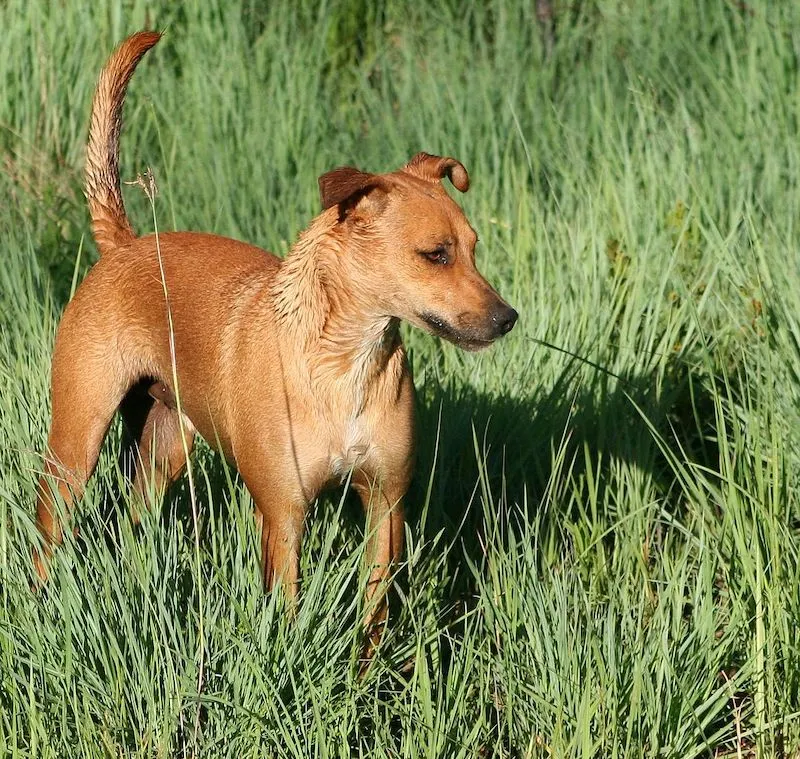
| Dog Breed Group | Hound |
| Breed Type | Purebred |
| Height | 20 to 24 inches |
| Weight | 50 to 100 inches |
| Coat | Short, compact |
| Color(s) | Black, black and tan, brown, white |
| Life Expectancy | 10–12 years |
| Temperament | Independent, territorial, friendly, alert |
| Origin | South Africa |
| Bred For | Natural breeding |
| Nickname(s) | Zulu dog, Bantu Dog |
| Recognized by the AKC | No |
| Recognized by the FCI | No |
Africanis Characteristics
| Characteristics | Rating |
|---|---|
| Adaptability | 3/5 |
| Friendliness | 4/5 |
| Kid-Friendly | 4/5 |
| Pet-Friendly | 2/5 |
| General Health | 4/5 |
| Grooming Needs | 3/5 |
| Trainability | 4/5 |
| Intelligence | 4/5 |
| Playfulness | 4/5 |
| Exercise Needs | 4/5 |
| Energy Level | 4/5 |
| Tendency to Bark | 3/5 |
| Tendency to Drool | 1/5 |
| Tendency to Snore | 1/5 |
| Tendency to Dig | 1/5 |
Little-known facts about the Africanis Dog Breed
Fact #1: They were bred naturally
Unlike many dogs we know, the Africanis were not the result of any cross breeding done by humans.
There were no experiments or any breeder who’d take the credit for the dog’s existence.
Natural selection led to the creation of the Africanis. This makes them natural and healthy.
Fact #2: They were once unloved
Dogs love to be loved. Many of them have been admired for centuries. This admiration made people adopt them as family companions.
Sadly, this wasn’t the case for the Africanis. They used to be called names and treated with scorn for no just reason. Some people even employed racial slurs to address this breed.
They have more fans now, fortunately, as they became household pets. People love them for their many beautiful qualities.
Fact #3: They have simple looks
The Africanis have no exotic coat, unusual face, or huge frame. Their slim body comes with no special markings, color mixtures, or long hair. They certainly aren’t ‘turning heads’ materials.
Nonetheless, while some see them as boring and unadorned, lovers of Africanis like them for who they are.
In appearance, the Africanis is a size medium with a small head, standing ears, and a curved tail.
Fact #4: There is a society dedicated to the Africanis
Founded in 1998 by John Gallant and Dr. Udo Kusel, the Africanis Society has the main objective of preservation, not perfection like some other animal societies.
They come complete with a code of conduct and standards for the Africanis breed. These regulations are meant to protect the African companions.
Fact #5: They have a natural resistance to parasites
One advantage of owning an Africanis is the low number of trips you’d make to the veterinary. Natural breeding made them develop an inner opposition to parasites.
Africanis are generally healthy dogs due to this immunity.
While this does not preclude them from falling ill, it does mean they are less likely to get some common medical conditions.
Africanis Breed History & Origin
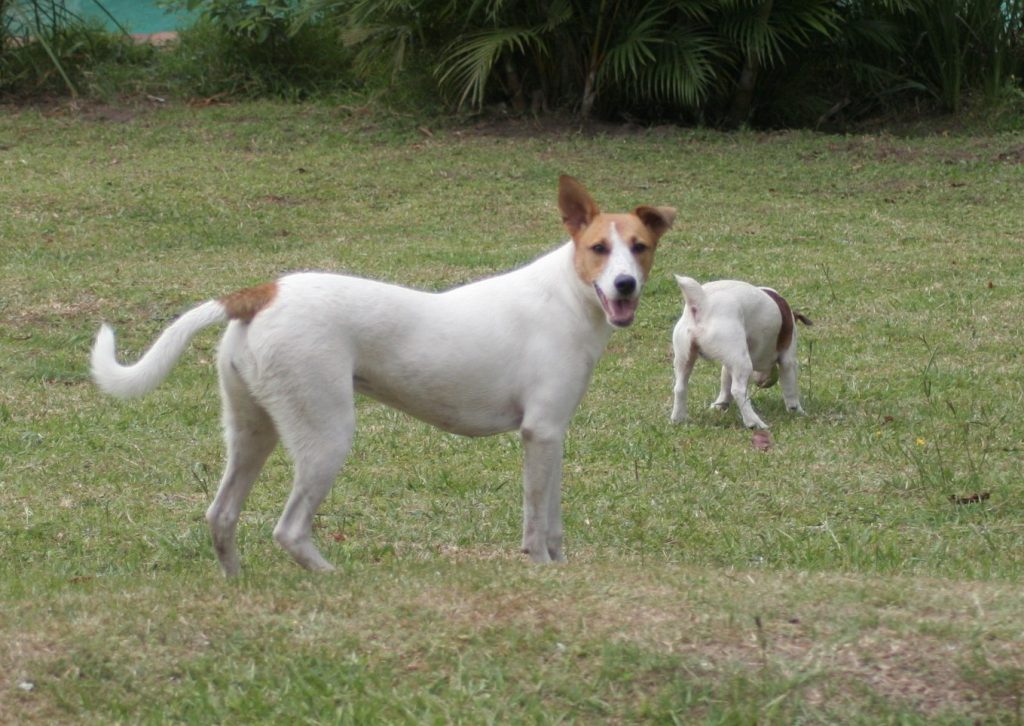
The natural selection and breeding of the Africanis make it hard to pinpoint an ancestor breed.
The probability is that they descended from wild hounds and castaway dogs in Africa of old.
In the society they lived in, they served as guardians, herders, and hunters.
Another theory on the Africanis descendance is that their forefathers may have been ancient Egyptian dogs.
Then, around the 6th century, travellers brought them to the southern parts of Africa.
Through the years, the Africanis have gone through many name changes. Some of the names they’ve been called are:
- Bantu Dog
- Umbwa wa ki-shenzi (traditional dog)
- Hottentot hunting dog
- Khoekhoe dog
- Tswana Dog
- Zulu Dog
In a bid to preserve the purity of this breed, the Africanis Society of Southern Africa was formed in 1998.
Today, in many African tribes, the Africanis still roam about.
The first westerners who came across them did not like them, but their reputation changed, thanks to the work of the Africanis Society.
They’ve since become a preferred household pet for many.
Africanis Temperament & Intelligence
Africanis are friendly, lovable, eager to please, and submissive. They are equally patient with people and get along with everyone in the family, adults, and kids.
They love their personal space, though, and may not always be open for hugs and cuddles.
Try not to push them during these moments or they may react in a way quite unlike their gentle nature. As they grow older, they tend to get grumpy.
Furthermore, Africanis are independent thinkers with a sense of creativity and a love for activities.
Ensure you keep them busy so their creativity won’t lead them to act in destructive ways.
They flow well with kids as well, though any interaction a small child has with a canine should be supervised.
Owners find them easy to take care of as they don’t have any high demands, are not unnecessarily aggressive, and are good in different environments.
As a pet parent, you’d find them to be humble, patient, and wonderful companions.
Training and obedience are easy with the Africanis. Even a new dog owner can make a decent attempt as the Africanis are docile, intelligent, and ready to please.
Teaching them is both achievable and less strenuous than other breeds. With enough positive reinforcements, motivations, and activities to keep their physical and mental selves intact, the Africanis will thrive.
If you are a new pet parent or you don’t want to go through the daunting task of training a stubborn, manipulative dog, the Africanis is your dog.
While they do a good job at notifying you of intruders, they are not biters and will not fight except in defense of those they love.
A final point to note is, though they may flow well with pets and other dogs, they are not pack animals.
Is an Africanis a good family dog?
The Africanis are kid-friendly, comfortable with other pets, and can adapt to different environments, as long as they get sufficient exercise.
Their submissive nature makes it easy to train them and it doesn’t take long to whip them up into well-mannered dogs. To say they make good household pets would be an understatement.
Pet owners with different levels of experience would enjoy raising an Africanis.
Nevertheless, your preference still matters. Some people want a ferocious guard dog who won’t hesitate to sink his teeth into an intruder.
Others may be seeking the challenge of breaking down a tough-willed dog. If you fall into these categories, the Africanis may not be the dog for you.
Having said that, this Africanis dog breed is definitely family material.
Are Africanis good with kids?
The Africanis are patient, soft, and loving when around children and can generally be trusted around them. They don’t snap at kids and tolerate some rough handling.
However, do well to supervise any play session your child has with a dog. Also, your kids should know how to treat a dog.
Yanking ears and pulling tails are not proper. Your pet deserves the right treatment.
Are Africanis good with other dogs and pets?
The Africanis can survive in a home with other pets and dogs. They are, however, territorial in nature and do not move in pack.
They may cause problems if they view the other dog as an enemy or if you try to put them in a pack. The Africanis submissiveness doesn’t let them go that far.
An ideal situation is to have your Africanis as a sole pet. If you want a house filled with dogs, consider getting another breed like Labrador Retriever rather than the Africanis.
Male vs Female Africanis Dog Breed
The male and female of any breed come with a set of strengths and weaknesses. For most owners, gender is a matter of preference. If you want to get your dog neutered, then gender should not be an issue for you.
However, if you prefer an unneutered pet, you may want to get information on the gender differences to make your choice easier.
The weight and height of male and female Africanis are similar. They both weigh 55 to 100 pounds with a height of 20 to 24 inches.
The genitals are the main difference. In general, the male genitals of any dog breed is visible and stick out, unlike the female.
Caring for an Africanis
The Africanis can be an apartment dog who’s comfortable lying around indoors. This is good for city dwellers.
However, they prefer having space to move around as they are energetic. They also require exercise or they may seek other less constructive ways to be busy.
It is best to keep them in an enclosed area with fences to prevent them from escaping to ‘explore’, especially if you live in the countryside.
Training this breed is easy and fun with enough motivation and rewards. They do well with obedience and want to please you. With enough games, instructions they can remember, and variety, they will learn.
They equally have a low grooming need and are not susceptible to many medical conditions other dogs are vulnerable to. However, they don’t do well in winter and should best be kept indoors at that point.
All in all, taking care of an Africanis is not complicated.
Africanis Food and Diet
What you feed your dog is essential to growth, overall health, and fitness. You have to get the right diets and proportions to avoid them either being underweight or overweight.
Africanis don’t have any special requirements. However, their diet should contain beneficial nutrients. Do not simply scoop any food into his bowl, even though they can manage a poor diet. Their size and energy should be put into account when giving them meals.
This breed is okay with quality dry food in about 3 cups. Although Africanis is not vulnerable to obesity, overfeeding can make them pile up unhealthy pounds.
Obese Africanis can suffer from breathing, digestive, and muscle complications. If your dog is overweight, feed them less and exercise more.
Certain nutrients are good for your Africanis and come highly recommended. Some of these nutrients are:
- Protein
- Fatty acids
- Carbohydrates
- Minerals
- Vitamins
In contrast, avoid feeding them human foods as this makes them gain weight.
Puppies and adult dogs do not have the same meal requirements, just like humans adults don’t eat like babies. Thus, do not feed a puppy the way you would an adult.
The Africanis puppy’s proportion depends a lot on age, but 2 cups is appropriate. When in doubt, consult your veterinarian.
The old Africanis requires lesser than both puppies and young adults. Their meal should be of smaller quantity than the younger one.
Africanis Exercise
Regular exercise is necessary for your dog, no matter what personality they have. As humans exercise to keep fit, healthy, and look good, dogs need to work out their bodies.
For some dogs, lack of exercise can get them antsy. The result of this is havoc on your belongings. Even if your dog isn’t so energetic, they need exercise.
Some dogs have a high exercise need going up to 30 minutes or an hour. Others are content with simple movements after which they lie down for the rest of the day.
Before choosing a dog, you have to know whether you can cope with the exercise needs. Of course, this depends on your lifestyle, personality, and work demands.
Africanis are highly energetic and need to burn it out. They love running and require a moderate to high level of exercise. If you are not used to an active life filled with exercise, the Africanis may not be for you.
Physical exercise consists of brisk walks, jogs, hikes, or just letting your Afghan run around the yard. A game of fetch does wonders too. The Africanis needs like an hour of exercise.
In addition to physical activities, add some mental challenges. When indoors for a long period—like during winter—provide them with balls and toys to play with
Puppies need a different exercise regime. If they are not up to nine months, they should not be allowed to participate in activities like jumping and running. You can start taking them on walks at 3 months, then increase frequency as they age.
Older dogs don’t need as much exercise as younger ones, but you still have to keep them fit. This helps them control weight and avoid joint pains.
The Africanis is man’s best friend, but only when they are trained. When they lack training, they become dangerous to everyone.
Even a gentle breed can turn wild without training. Thus, before you get a dog, you need to answer these few questions:
- Do you have the time to commit to your dog’s upbringing?
- Are you experienced enough?
- Can be breed be a domestic pet?
- How trainable is your favourite breed?
Also, know how to distinguish training from abuse. While you need confidence and strictness to teach your dog good manners, harsh treatments and punishments are not necessary and may do more harm than good.
Socialization is a must for any dog. Take them to different places and unwrap the world. Let them meet new people, get accustomed to unfamiliar sights, smell unknown scents and be friendly.
Africanis may be independent, but they are also submissive, intelligent, and eager to please, so they are trainable. Use positive methods of training to gain enough results. They get easily
bored, which is where diverse activities come in.
A new pet parent will find training an Africanis a possibility. They are good first choices of pets for the inexperienced.
Africanis Grooming Needs
Alongside other needs, your dog has to be neat and presentable. Some dogs shed a lot, others don’t. Either way, they should be groomed.
If you have the experience and time, you may do it yourself. If not, consider hiring a groomer to get the job done.
The Africanis don’t shed much, thus, they have a low maintenance need. You don’t need to hire a groomer to groom an Africanis as they don’t have any specific requirements. A daily brush and regular bath are enough.
Their teeth and nails shouldn’t be neglected too. Make sure you brush their teeth at least twice a week and trim their nails before they get too long.
Africanis Health Conditions
The Africanis has a strong immune system that makes him one of the healthiest dog breeds. Natural selection makes them able to resist both internal and external parasites.
Having said that, a major concern you should have with the Africanis is the dermoid sinus, a defect that affects a dog’s back, neck, and tail. They are equally susceptible to rabies.
Frequently Asked Questions
Is an Africanis right for you?
The Africanis is a friendly, docile, intelligent, and strong breed that’s good for both new and experienced owners. It is easy to train and take care of them.
They are also adaptable to living indoors. If you like a dog who’s ready to please and won’t give you a tough time, the Africanis is right for you.
What are Africanis known for?
The Africanis unique characteristic stems from the fact that they were naturally bred, without human interruption. This is unlike some other breeds who came about through the effort of breeders. They are also well-known thanks to their African roots.
How big is a full-grown Africanis?
An adult Africanis is big in size. They weigh about 50 to 100 pounds with a height of 20 to 24 inches.
Do Africanis like to cuddle?
While they are playful and loving, Africanis like their personal space and would want to be alone a lot of times. They may not always appreciate hugs and cuddles.
Is it hard to take care of an Africanis?
The Africanis is a low-maintenance breed that can survive harsh weather and even manage a poor diet. Plus, they don’t always shed. They are very easy to take care of.
How Long do Africanis live?
An Africanis is one of the healthiest breeds in the world with natural immunity against parasites. They have a life span of 10 to 12 years.
How Much are Africanis?
You can get an Africanis puppy at $300 to $500. For a fully grown Africanis, budget an estimate of $650.
Do Africanis shed?
Africanis don’t have much hair on their coat and do not shed too much. They are low shedders and only do so during the natural hair growth process.
To Wrap Up
The Africanis are aboriginal with many wonderful traits that make them a favorite choice for new and veteran dog owners.
Like any other breed, they deserve your love and commitment to training them into dogs that fit into society. You equally should meet their needs for exercise, space, and adequate training.
With this key Africanis dog breed information and facts, it shouldn’t be difficult for you to decide whether or not the Africanis is the pet for you and your household.
If you do believe it fits your image of a dog, consider adopting from shelters.
Related: A to Z List of Dog Breeds
Helpful Resources
- Official Breed Club: The Africanis Society
- Breed Standard: The Africanis Society Guidelines for Breeders

